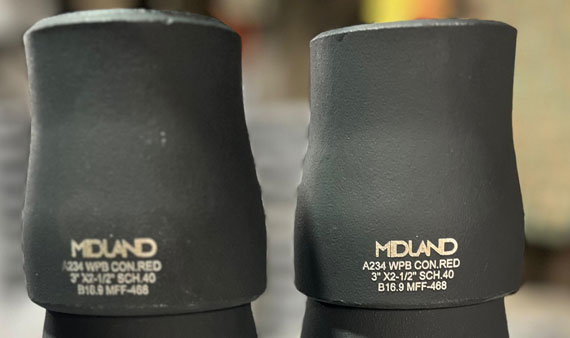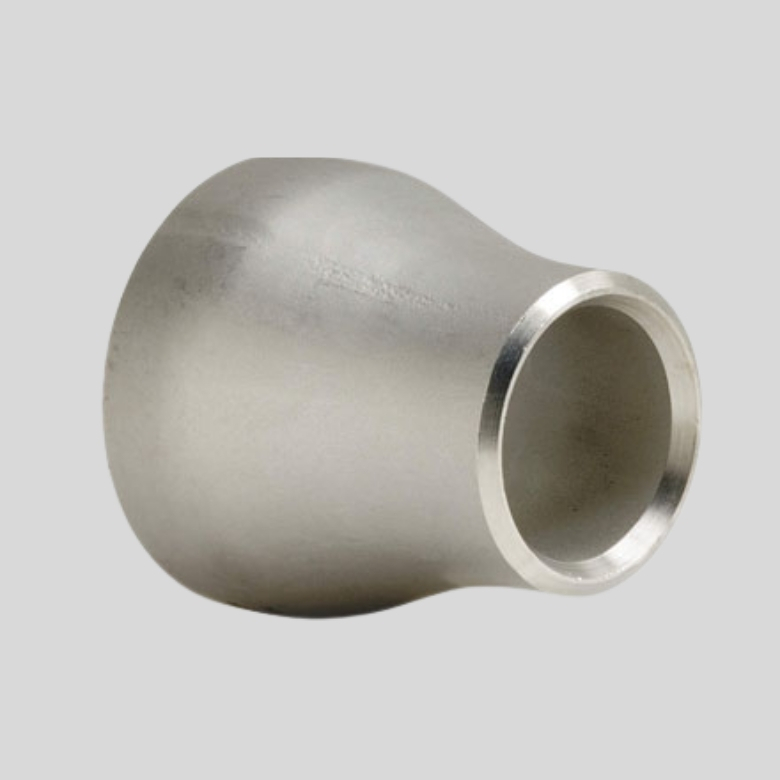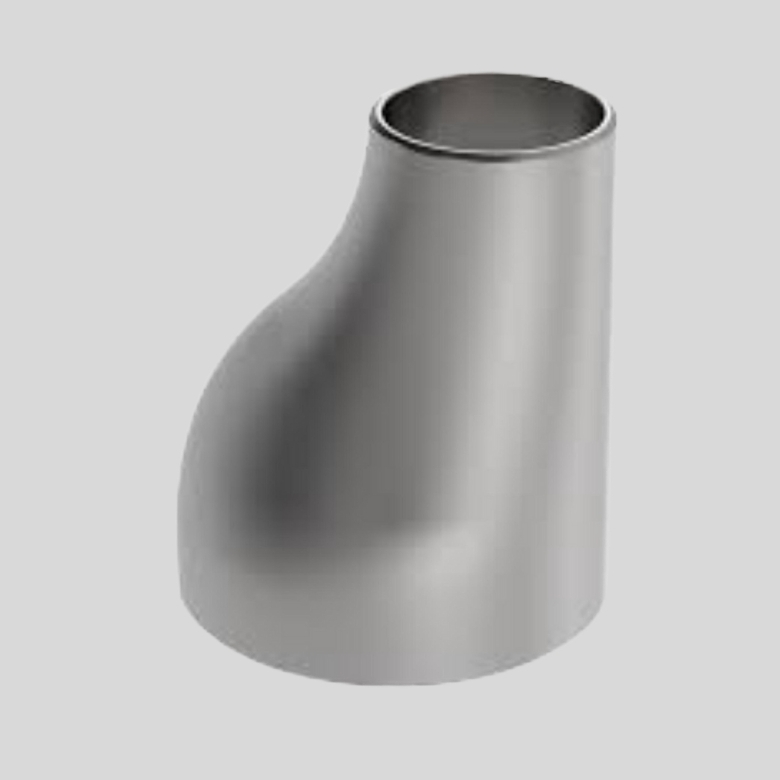- Home
- Buttweld Pipe Fittings
- Reducer (Concentric & Eccentric)
Reducer (Concentric & Eccentric)
Buttweld Reducer: Specifications | Materials | Types | Dimensions | Weight Chart | Tolerances | FAQ
ASME B16.9 Buttweld Concentric Reducer Manufacturer & Exporter | Stainless Steel, Carbon Steel, Alloy & High Nickel Eccentric Reducers (Seamless & Welded Sch 40 / Sch 80) – Supplied to Germany, Australia, South Africa

Best Export Prices: sales@midlandforgefittings.com
Midland Forge and Fittings Pvt. Ltd. is a globally trusted manufacturer and exporter of high-quality concentric and eccentric reducers. Backed by decades of engineering expertise and precision manufacturing, we specialize in delivering seamless and welded reducers that meet ASME B16.9 standards. Our reducers are designed to provide smooth transition in piping systems, reduce turbulence, and ensure reliable flow control across industries such as oil & gas, petrochemical.
At Midland, quality isn’t just a standard—it’s a commitment. We follow a stringent quality policy that aligns with international benchmarks, ensuring that every reducer we produce passes thorough testing for dimensional accuracy, pressure integrity, and corrosion resistance. Our ISO-certified facility is equipped with advanced CNC machines, in-house testing labs, and a dedicated QA/QC team that monitors every stage of production.
Our concentric reducers are ideal for vertical piping systems where flow alignment is crucial, while our eccentric reducers are tailored for horizontal pipelines to prevent air pockets and ensure smooth drainage. Both types are available in a wide range of sizes and materials, offering optimal performance in critical applications. We also offer customized solutions based on client specifications, drawings, and industry needs.
Midland Forge and Fittings Pvt. Ltd. exports to numerous industrial markets across Europe, Southeast Asia, the Middle East, and Africa, earning the trust of EPC contractors, fabricators, and large-scale end users. Their reputation is built on timely delivery, ethical business practices, and a customer-first approach. With a vision rooted in engineering excellence and global reach, Midland continues to forge strong partnerships and lead the way in pipe fitting innovation.
Concentric & Eccentric Reducer Specifications, Sizes & Standards
Size Range – Seamless
Wall Thickness
Marking
Fitting Types
Size Range – Welded
Ends Connection
Manufacturing Standards
Materials
Size Range – Fabricated
Dimensional Standards
Testing
Surface Finish
Buttweld Reducer– Materials, Grades & Standards
| Material Category | Grade | Standards (ASTM / ASME) | Typical Use/Application |
|---|---|---|---|
| Stainless Steel | 304 / 304L / 304H | ASTM A403 WP304/304L/304H | General purpose, corrosion resistance |
| 316 / 316L / 316H | ASTM A403 WP316/316L/316H | Marine & chemical applications | |
| 317 / 317L | ASTM A403 WP317/317L | High corrosion resistance | |
| 321 / 321H | ASTM A403 WP321/321H | High temperature, stabilized | |
| 347 / 347H | ASTM A403 WP347/347H | High-temp pressure systems | |
| 904L | ASTM A403 WP904L / B625 | Acid handling, sulfuric environments | |
| 254 SMO | ASTM A403 / B366 | High chloride environments | |
| Carbon Steel | A234 WPB / WPC | ASTM A234 | Pressure piping & general piping systems |
| A420 WPL6 | ASTM A420 | Low temperature services | |
| Alloy Steel | A234 WP1 / WP5 / WP9 | ASTM A234 | High-temp & pressure pipelines |
| A234 WP11 / WP22 | ASTM A234 | Steam lines & refineries | |
| A234 WP91 | ASTM A234 | Power generation, high performance | |
| Duplex Steel | UNS S31803 / S32205 | ASTM A815 / A790 | Corrosion & high strength use |
| Super Duplex Steel | UNS S32750 / S32760 | ASTM A815 / A790 | Offshore, seawater applications |
| Nickel Alloys | Nickel 200 / 201 | ASTM B366 / B162 | Alkali & chemical processing |
| Inconel 600 / 625 / 718 | ASTM B366 | Heat exchangers, aerospace | |
| Incoloy 800 / 825 | ASTM B366 | Petrochemical & chemical processing | |
| Hastelloy C22 / C276 | ASTM B366 | Severe corrosion resistance | |
| Monel 400 / K500 | ASTM B366 | Seawater, chemical industries | |
| Alloy 20 | ASTM B366 | Sulfuric acid services | |
| Nimonic 75 / 80A | ASTM B366 / B637 | High-temp applications | |
| Copper Nickel | Cu-Ni 90/10 / 70/30 | ASTM B466 / B467 | Marine systems, seawater service |
| Titanium | Grade 2 / Grade 5 | ASTM B363 | Lightweight, corrosion resistance |
| Aluminium | 6061 / 5083 | ASTM B361 | Low-pressure, non-corrosive piping |
Request for an Immediate Offer?
We will reply you in 2 hours during support time!
Conctact Now!Explore All Products
Types of ASME B16.9 Buttweld Reducer
Dimensions of Reducer (Concentric & Eccentric)

| NPS (Inch) | OD Large End (A) | OD Small End (B) | End to End (H) |
|---|---|---|---|
| 1 × 3/4 | 33.4 mm | 26.7 mm | 38 mm |
| 1¼ × 1 | 42.2 mm | 33.4 mm | 38 mm |
| 1½ × 1¼ | 48.3 mm | 42.2 mm | 51 mm |
| 2 × 1½ | 60.3 mm | 48.3 mm | 64 mm |
| 2½ × 2 | 73.0 mm | 60.3 mm | 76 mm |
| 3 × 2½ | 88.9 mm | 73.0 mm | 89 mm |
| 4 × 3 | 114.3 mm | 88.9 mm | 102 mm |
| 5 × 4 | 141.3 mm | 114.3 mm | 127 mm |
| 6 × 5 | 168.3 mm | 141.3 mm | 152 mm |
| 8 × 6 | 219.1 mm | 168.3 mm | 178 mm |
| 10 × 8 | 273.0 mm | 219.1 mm | 203 mm |
| 12 × 10 | 323.8 mm | 273.0 mm | 229 mm |
| 14 × 12 | 355.6 mm | 323.8 mm | 254 mm |
| 16 × 14 | 406.4 mm | 355.6 mm | 279 mm |
| 18 × 16 | 457.2 mm | 406.4 mm | 305 mm |
| 20 × 18 | 508.0 mm | 457.2 mm | 330 mm |
| 24 × 20 | 609.6 mm | 508.0 mm | 381 mm |
Weight Chart: ASME B16.9 Buttweld Reducer (SCH 40 / STD)
| Size (Inches) | Concentric Reducer (kg) |
|---|---|
| ½” | 0.10 |
| ¾” | 0.15 |
| 1″ | 0.25 |
| 1½” | 0.70 |
| 2″ | 1.10 |
| 3″ | 2.60 |
| 4″ | 4.60 |
| 6″ | 9.60 |
| 8″ | 16.00 |
| 10″ | 24.00 |
| 12″ | 35.00 |
| 14″ | 48.00 |
| 16″ | 64.00 |
| 18″ | 82.00 |
| 20″ | 105.00 |
| 24″ | 145.00 |
| 26″ | 170.00 |
| 28″ | 195.00 |
| 30″ | 225.00 |
| 32″ | 250.00 |
| 36″ | 310.00 |
| 40″ | 380.00 |
| 42″ | 410.00 |
| 44″ | 440.00 |
| 48″ | 500.00 |
Reducer Buttweld Fitting Tolerances as per ASME B16.9
| Fitting Type | Parameter | Tolerance | |
|---|---|---|---|
| Up to 4” NPS | Above 4” NPS | ||
| Reducer (Concentric & Eccentric) | Outside Diameter at Bevel | ±1.6 mm (1/16″) | ±1.6 mm (1/16″) |
| Center-to-End (A, B) | ±1.6 mm (1/16″) | ±3.2 mm (1/8″) | |
| Wall Thickness | -12.5% (no positive tolerance) | ||
| Ovality | Shall not exceed 1% of specified OD | ||
How to decide whether to use a concentric or eccentric reducer in my piping design?
Concentric Reducers:
- Flow Consideration: Maintain a centered, symmetrical flow path, which helps reduce turbulence and pressure drops.
- Orientation: Ideal for vertical or inclined pipelines where alignment with other equipment is important.
- Applications: Commonly used on pump discharge lines, vertical piping runs, or wherever the piping layout allows the reducer to be centered.
- Advantages: Easier to fabricate, install, and maintain uniform flow velocity through the reducer.
Eccentric Reducers:
- Flow Consideration: Offset the pipe centerline to either the top or bottom of the pipeline. This prevents air pockets in horizontal lines and ensures the pipe is fully filled or drained.
- Orientation: Best suited for horizontal piping. The flat side is typically oriented on the top for suction lines (to avoid air accumulation) and on the bottom for drainage lines.
- Applications: Horizontal suction lines, condensate or sludge pipelines, and low-point drainage systems.
- Advantages: Reduces the risk of cavitation in pumps, avoids gas or air entrapment, and improves system efficiency in horizontal runs.
Design Decision Factors:
- Pipeline Orientation: Vertical → concentric; horizontal → eccentric (usually flat side on top for suction).
- Fluid Type: Gases or liquids prone to entrapped air → eccentric preferred.
- Space Availability: Concentric is suitable when space permits, eccentric for compact horizontal runs.
- System Requirements: Pumping, drainage, and flow control considerations affect which reducer type will optimize system performance.
Can reducers be used in hygienic or food-grade piping systems?
Reducers in hygienic or food-grade piping systems must meet strict cleanliness and material standards to avoid contamination and maintain product quality. Typically, stainless steel grades such as 304 or 316L are used because they are corrosion-resistant, durable, and safe for direct contact with food and beverages.
Key points include:
-
Material Selection:
- Stainless steel 304 or 316L is preferred for its corrosion resistance and food-safe properties.
- 316L is often chosen for more corrosive environments due to its higher molybdenum content.
-
Surface Finish:
- Inner surfaces are polished to a smooth finish (often 0.5–0.8 µm Ra) to minimize bacterial growth and facilitate cleaning.
-
Compliance and Standards:
- Manufacturers ensure reducers comply with FDA, 3-A Sanitary Standards, or ASME BPE regulations.
- Compliance ensures compatibility with CIP (Clean-in-Place) and SIP (Sterilization-in-Place) processes.
-
Applications:
- Commonly used in pharmaceutical, dairy, beverage, and other hygienic processing pipelines.
- Suitable for connecting pipes of different diameters while maintaining a sanitary flow path.
These reducers ensure both mechanical integrity and hygienic safety, making them essential components in food-grade and sanitary piping systems.
Are reducers compatible with automated welding systems or orbital welding?
Yes, reducers can be designed and manufactured to meet the precise tolerances and surface quality required for automated welding processes, including orbital TIG welding. These welding techniques are often used in high-purity, high-volume, or critical applications—such as pharmaceutical, food-grade, semiconductor, or chemical processing systems—where consistent, defect-free welds are essential.
Reducers intended for automated welding are typically prepared with:
- Accurate dimensions and tolerances: Ensure proper alignment with mating pipes.
- Smooth, clean surface finishes: Prevent contamination or welding defects.
- Material consistency: Matches the welding process requirements (commonly stainless steel grades like 304L or 316L).


